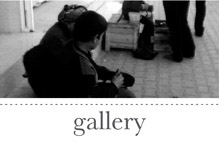Alaa Aljbouri, an Iraqi journalist since 1994, has hosted several television programs that focus on women’s rights and politics. She is a founding member of the network of Iraqi communicators opposed to violence against women and children. She is currently head of the section on women’s affairs in the newspaper “Al-Ahali,” based in Baghdad.
*A Mahram is a person with whom marriage is forbidden, such as a brother or father. He assumes the role of guardian because it is assumed that women are unable to make their own decisions or control their emotions and desires.
In Iraq, the year 2009 concluded with the imposition of a Mahram on all female council members of the city of Wasset, and the year 2010 began by requiring the presence of a Mahram as a condition of travel for all female Iraqis. There are three types of Mahram in Iraq: the Mahram in public accommodations; the Mahram that allows access to the city council; and finally the Mahram that allows a woman to obtain a passport.
In Baghdad’s airport, I was rolling my heavy suitcases and trying to quickly finish the formalities of my trip when, suddenly, in the final stages, a border police officer stopped me and told me that I was forbidden to travel! For a moment, I felt trapped, and I had the feeling that I was being accused of terrorism, but I quickly understood that I was not allowed to leave the country because a Mahram was not accompanying me!
I tried to explain to the officer that I was leaving Iraq to take a teaching exam, and that the necessity of taking a Mahram would prevent me from taking advantage of this opportunity. In a moment of anger, I heard the announcement that my plane was leaving soon. At that exact moment, I hated everything: I hated my diploma and my work for the media, which is considered one of the most dangerous jobs in the world as a result of the violence in Iraq since 2006. I hated the law on Mahram that had supposedly been enacted to prevent me from making mistakes. This law assumes that women lack intelligence and do not respect religious beliefs. It also accuses women of being prisoners to their desires, which impairs their judgment and causes them to commit forbidden acts. The Mahram protects them from themselves, and their weakness when faced with their desires. That’s what the intellectual and religious leaders in our Middle Eastern society say and write, specifically Islamic.
Another traveler saved me from my rage by saying, “You’re that person. I’ve seen you on channel (x).” That made me aware of the fact that, as a journalist, I worked in a domain that could easily lead to my death if my name or my photo were made public, and that I risked dying in the streets of Baghdad, victim to a booby-trapped car. I interrupted him by saying that I was indeed the person of whom he spoke. Immediately, I raised my voice to the officer and told him that I was not going to let him do this to me without speaking to the person in charge. I told him that the practice of Mahram had ended with Saddam’s regime, that we were living in 2006, and that this action was no longer allowed! I added, “Are you saying that Saddam’s regime has been overthrown, but that his laws remain?” Every time he tried to insist, I raised my voice. I was further encouraged by the others who insulted the officer and condemned his behavior. It was in this manner that a security officer came and took me to those in charge. They were understanding and authorized me to travel. The police officer then tried to justify his behavior to his bosses by explaining that he had forbidden me to travel because the country where I was going used the law of Mahram, and so they would send me back as soon as I arrived. I responded, “The law of the country where I’m traveling applies only to its citizens, not to Iraqi women.” It was thus, at the last minute, that I was authorized to travel. I boarded the plane and was applauded by the other passengers: “Good woman!” “Congratulations, you didn’t give up.” “What sort of under-development is this? When will we finally evolve?”
I would never have imagined going back to this old practice of Mahram that is an obstacle to free travel and free movement of women. From now on, this practice is mandatory for a woman to be granted a passport. What will the widows and the wives of prisoners and immigrants do to get a passport? They will have to ask permission from a Mahram, whether it be their father, brother, or any other person with whom they are unable to marry.
Iraqi women fight daily to overcome political conflicts and to bear the consequences of the previous wars fought by Saddam’s regime. In addition to all of that, they must submit to the will of our leaders, who have put in place laws that contradict the constitution that they themselves wrote. Article 14 stipulates, “All Iraqis are equal under the law, without discrimination based on gender, race, or tribal affiliation.” Article 15 states, “Everyone has the right to life, security, and freedom, and it is forbidden to deprive or restrict these rights except in conformity with the law.” Finally, Article 13 affirms, “Do not enact laws that contradict the Constitution.” Despite this, when it comes to the rights of Iraqi women, our leaders prefer dictatorial laws in the fashion of Saddam.
Dear leaders, you have said that the Iraqi parliament is characterized by the presence of more than 80 female members, and that that number exceeds that of any other parliament in the world. This number confirms Iraq’s march towards democracy. But I have a question for you. Are female members of parliament from around the world forbidden to stay in a five-star hotel without the presence of a Mahram, like in Iraq? Do female city council members from around the world have Mahrams with them, save in the municipality of Wasset in Iraq? Do members of parliament in democratic countries need a guardian to come with them in order to get a passport? Which countries require these things? Are they the countries of democracy and human rights in whose steps you are following?
I do not pity our leaders because they have a masculine mentality that contradicts the principles of democracy. But I ask myself this question: what is the role of the parliamentary committee on women and children? And the role of the ministry on women? Aren’t the 80 female members of parliament concerned with the issue of the Mahram and the suffering of Iraqi women?












